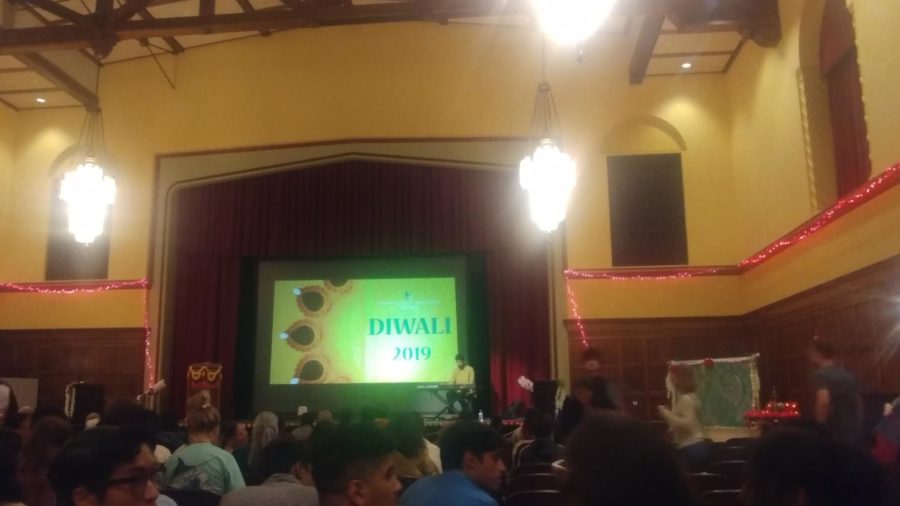Diwali festival highlights Indian culture and traditions
Susannah Crichton/ Iowa State Daily
Attendees pack into the Great Hall of the Memorial Union on Sunday for Diwali, also known as the Festival of Lights.
November 18, 2019
The Indian Student Association (ISA) is the second largest student organization on campus and hosts several prominent events throughout the year to bring the international community together, but Diwali is the largest event put on every year.
The festival was sold out once again this year.
During the pre-event in the Sun Room, a variety of activities and tables offered insights into Diwali and Indian culture, and hot Indian chai and packages of Parle-G biscuits were available.
A wide variety of people from families and young children to students and grandparents were present at the event.
The Great Hall was lined with red string lights and strands of yellow, orange and white flowers hung on the walls. Candles flickered on the tables along with golden dishes and chalices over red tablecloths.
Attendees could color in rangoli designs laid out on a large paper, have their names written in Indian scripts or play one of several Indian games such as kancha, where a player slingshots a marble with their fingers to knock other marbles out of place.
The Hindu Yuva club had several members answering questions about Diwali and Hinduism, and talked about their own upcoming events such as the Yogathon in January.
“Diwali is the biggest festival for me, […] it has multi-layered meanings,” said Madhav Pathak, a graduate student in electrical and computer engineering. “One is definitely there’s a story behind it. This story is five thousand years old, so still this day, we put up lights, we put up these urban lamps to celebrate and decorate our homes. Second is the philosophical meaning behind this whole festival; it’s like lighting a lamp in darkness. If there is ignorance, then we light the lamp of knowledge. If there is empathy, or there is a need of help, then we go and help them.”
The main show began with short speeches and introductions from people such as Rahul Namboori, president of ISA and a senior in management information systems.
The first performance of the night was by the Proper Patolas, a group that blends Bollywood and hip hop dance in a high energy show.
Next was the Southern Squad, a group of women from South India that performed a fusion of their traditional dances and more contemporary styles.
Two more dancers came on after Southern Squad, performing a tribute to the well-known Indian actress and dancer Madhuri Dixit, followed by soloist dancer Chinar.
The Punk Punditz group played several songs in a blend of Indian music traditions.
Videos of students sharing their own Diwali stories from home was shown between performances, as well as trivia about the mythology and traditions of Diwali.
The last three acts were presented by the Forum Dance Studio, the Calcutta Classicals and the Bhangra Dance Club.
Diwali is one of the most significant events in Indian culture, and it is celebrated all over India and the world. It commemorates the return of the god Ram from his defeat of the evil Ravana, and also the god Krishna’s defeat of Narakasura.
“Basically, how Diwali started was, it’s a victory over evil,” said Priyanka Kadaganchi, junior in computer engineering and vice president of the ISA. “So, the god Ram, he had a victorious fight over the evil person Ravana, so while he was coming back there was a huge celebration in India. So, all of India was lit up with diyas.”
Kadaganchi also said it is also about helping one another.
“Diwali is about the fireworks, people clean their house, there are a lot of sweets that are prepared, […] we go to other people’s house[s] and greet them, and just have a good and fun time,” Kadaganchi said. “It’s all about spending time with your family, having good memories with your family.”
Kadaganchi described the practice of puja that is also done during Diwali.
“The men of the family, they do puja of the women of the family, […] like daughters, because they consider them as Lakshmi,” she said. “Lakshmi is a goddess, so it is a respect. […] It’s mainly because daughters are a blessing. If they are born in the house, it’s a blessing for that family. […] It’s appreciation.”
Diwali marks the new year and signifies a new start for the Indian community. It has numerous deep meanings for Indians, and during this time Iowa State is able to experience the Festival of Lights and catch a glimpse of Indian culture on campus.

















